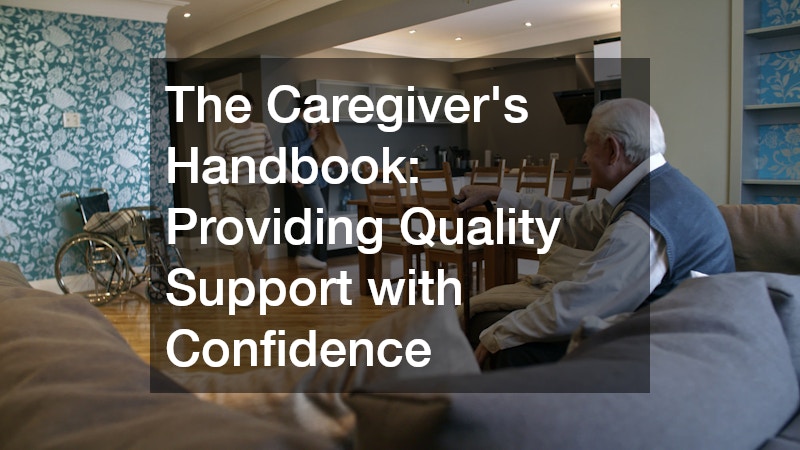
Caregiving is a vital role that holds immense importance in society, providing essential support to individuals in need. With the increasing demand for caregivers, structured guidance becomes crucial in empowering those taking on these responsibilities. This handbook aims to provide caregivers with the tools necessary to offer effective support, bolster their confidence, and gain a comprehensive understanding of the caregiving process.
The Importance of Active Listening
Active listening is a critical component of effective communication, especially in a caregiving context. By attentively listening, caregivers can better understand the specific needs and concerns of their recipients. Implementing strategies such as paraphrasing and asking open-ended questions allows caregivers to validate the feelings of those they care for.
Active listening not only helps in addressing immediate concerns but also in building trust over time. Care recipients feel valued and understood when caregivers make an effort to listen attentively. This practice streamlines the caregiving process, enhancing the overall quality of care provided.
Non-Verbal Communication Techniques
Non-verbal communication plays a significant role in conveying empathy and support. Techniques such as using positive body language, maintaining eye contact, and adapting facial expressions can greatly enhance mutual understanding. These non-verbal cues often speak louder than words in the caregiving relationship.
Understanding the role of non-verbal communication enables caregivers to connect on a deeper level with their recipients. For instance, a gentle touch or a reassuring smile can offer comfort and reassurance. Caregivers should be mindful of these signals to avoid misinterpretations and to foster a more profound connection.
Handling Difficult Conversations
Inevitably, caregivers will encounter challenging discussions that require both empathy and tact. Approaching difficult conversations with a mindset of respect and understanding is key. It helps to frame discussions positively, focusing on solutions rather than problems.
Caregivers should prepare for these conversations by gathering relevant information and considering the feelings of the care recipient. This preparation paves the way for open dialogue, providing a platform for both parties to express their concerns. Handling these situations effectively can strengthen the caregiving relationship and alleviate potential stressors.
Time Management and Organization
Effective time management and organization are fundamental skills every successful caregiver must possess. Establishing a routine and developing a clear schedule can significantly improve caregiving efficiency. This practice ensures that important tasks are prioritized and completed on time.
Caregivers who are adept at organizing their responsibilities can minimize stress and prevent burnout. By creating a structured environment, they can focus on providing high-quality care without feeling overwhelmed. Techniques such as to-do lists and digital reminders help manage daily tasks efficiently.
Emotional Resilience and Stress Management
Caregiving can be emotionally demanding, making resilience and stress management indispensable skills. Building emotional resilience helps caregivers navigate challenging situations without getting overwhelmed. It is essential for caregivers to identify and adopt stress-reduction techniques that work best for them.
Practices such as mindfulness, meditation, and regular physical activity contribute to maintaining emotional health. These techniques offer caregivers a means to recharge and manage the emotional complexities of caregiving. Emotional resilience fosters a positive outlook, which is crucial when faced with caregiving challenges.
Health and Safety Knowledge
A thorough understanding of basic health care procedures and safety protocols is essential for effective caregiving. This knowledge enables caregivers to handle medical situations confidently and make informed decisions. Familiarity with first aid techniques and emergency responses can be lifesaving in critical times.
In addition, caregivers should be educated about specific medical conditions that affect their care recipients. This understanding allows for tailored care approaches and enhances the quality of care provided. Staying informed about health developments and continuing education also benefit caregivers in their role.
Setting Boundaries
For caregivers, setting boundaries is a vital aspect of balancing caregiving responsibilities with personal life. Recognizing personal limits and assertively communicating them helps protect personal time and energy. It ensures that caregivers can provide quality care without sacrificing their own well-being.
Establishing boundaries also prevents emotional exhaustion and maintains a healthy work-life balance. Caregivers should regularly evaluate their commitments and prioritize time management strategies. Clear boundaries foster mutual respect between caregivers and their care recipients.
Seeking Support and Resources
Caregivers do not have to face their responsibilities alone, which makes seeking support and resources invaluable. Community resources and support groups can offer guidance, companionship, and practical advice. These networks serve as a reminder that caregivers are part of a larger, supportive community.
Professional help, such as counseling or respite care services, can also offer significant relief when the demands of caregiving become overwhelming. Utilizing these resources allows caregivers to recharge and maintain their own health and well-being. It provides a necessary break and ensures sustained, effective caregiving.
Caring for the Caregiver
Prioritizing self-care is not a luxury but a necessity for caregivers, ensuring they maintain the ability to provide sustained care. Recognizing the signs of caregiver burnout allows for timely intervention and promotes long-term health. Self-care practices, such as pursuing hobbies and engaging in social activities, are crucial in maintaining mental and physical well-being.
In summary, providing quality caregiving involves effective communication, the development of essential skills, and maintaining a healthy balance between caregiving responsibilities and personal life. Caregivers who embrace these principles can offer outstanding support while preserving their own well-being. We encourage readers to further explore this handbook, which offers comprehensive guidance and continuing educational opportunities for both novice and experienced caregivers.


